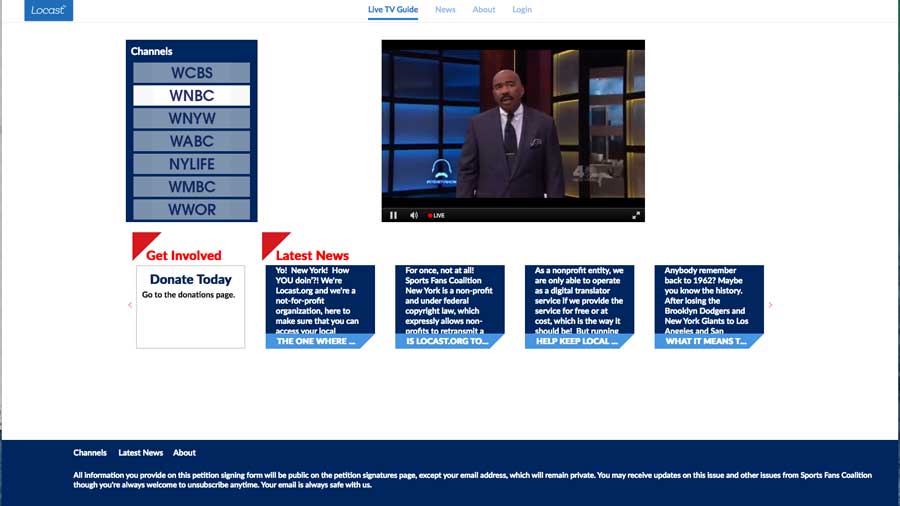Sports Coalition Takes Free TV Over the Top

The smarter way to stay on top of broadcasting and cable industry. Sign up below
You are now subscribed
Your newsletter sign-up was successful
The Sports Fans Coalition is not making new broadcaster fans with its launch of Locast, providing free over-the-top access to New York TV station signals, sort of like the streamed version of broadcasting’s FOTA (free over-the-air) service.
Coalition chairman David Goodfriend, a veteran Democratic government-affairs professional and former Dish Network executive, is behind the not-for-profit service.
The launch was timed to make last weekend’s big NFL playoff games available free, over-the-top, via locast.org.
While broadcasts are already free over the air, whether or not they can be retransmitted via the internet without permission or compensation has been a thorny issue.
One problem is that it would give broadcasters less control of their signal in retransmission impasses, where access to that signal is their chief bargaining chip.
In fact, back in 2010, Cablevision Systems, in the midst of a retrans blackout of Major League Baseball’s World Series on Fox stations, encouraged nonprofits to use the same Copyright Act carve-out that Locast is invoking now to deliver the games over the internet for free.
The coalition, which set up a New York chapter to establish the necessary nonprofit profile in the market, does not need to get the stations’ permission or pay retransmission fees, said Goodfriend, who, frankly, expects to be taken to court.
The smarter way to stay on top of broadcasting and cable industry. Sign up below
“We’re going to give it a shot and we’re going to get sued,” he conceded.
Goodfriend and the newly launching locast.org (a contraction of “local” and “broadcast”) are relying on Title 17, Chapter 1, section 111 a)5 of the Copyright Act — which, for those without a copy handy, covers exemptions from exclusive rights to broadcast transmissions. It grants that exemption if “the secondary transmission is not made by a cable system, but is made by a governmental body, or other nonprofit organization, without any purpose of direct or indirect commercial advantage, and without charge to the recipients of the secondary transmission other than assessments necessary to defray the actual and reasonable costs of maintaining and operating the secondary transmission service.”
That is the same provision under which TV translators already boost broadcast signals, Goodfriend noted, saying it should not matter what the technology is.
The key is the nonprofit status, which Goodfriend says his coalition clearly has. Armed with that statute, Goodfriend is rolling out the service, with plans to expand into other markets if the model passes legal muster.
The service is geofenced, which means it will not be available outside the New York DMA and thus does not run into contractual exclusivity issues. Though the statute does not necessarily confine broadcasts to in-market retransmission, Goodfriend said he is not looking to test that theory just yet.
Goodfriend said locast.org will seek donations to cover payments to defray actual and reasonable costs, in this case a content delivery network (CDN) to stream the content.
While he says he sought financial support from some of his clients — including Google, Dish Network and The Weather Channel — there were no takers. Goodfriend said that is because they are not sure it will help or hurt them.
NAB: ‘Deeply Skeptical’
“Over the years, numerous services from Aereo to FilmOn have tried to find creative ways to skirt the communications and copyright laws that protect local broadcasters and our tens of millions of viewers,” National Association of Broadcasters spokesman Dennis Wharton said. “Without more details, this effort by the Sports Fan Coalition sounds like the latest such effort. We are deeply skeptical that this service will survive legal scrutiny where its predecessors have failed.”
Public Knowledge, one of whose staffers is on the Locast board, was all for the new service.
Contributing editor John Eggerton has been an editor and/or writer on media regulation, legislation and policy for over four decades, including covering the FCC, FTC, Congress, the major media trade associations, and the federal courts. In addition to Multichannel News and Broadcasting + Cable, his work has appeared in Radio World, TV Technology, TV Fax, This Week in Consumer Electronics, Variety and the Encyclopedia Britannica.

